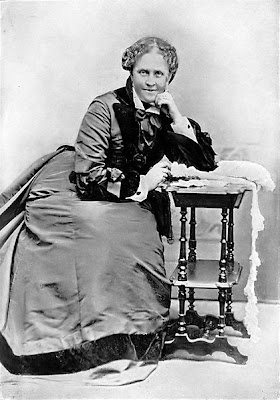Born this day in 1830: Helen Hunt Jackson (1830–1885), poet, travel writer, novelist, and defender of Native American rights.
Helen Hunt
Jackson was born Helen Fiske in Amherst, Massachusetts. She received a good
education, and after the deaths of her husband, Captain Edward Hunt, and her
two sons, she earned her living writing. Dismissive of limelight (or following
the conventions of the day), she published most of her works—book reviews,
travel writing, and poetry—anonymously or under a pseudonym. She had been friend to Emily Dickinson since childhood, so her name was not unknown in literary circles. Ralph Waldo Emerson
regarded her as one of the greatest poets of the day.
In 1879 her new husband, William Jackson, brought
her to hear a talk given by Standing Bear of the Ponca people. Helen Hunt
Jackson was so moved by Standing Bear’s description of his people’s treatment
by the United States government that she became that thing she deplored: a
woman with a cause. She undertook a study of U.S.–Native American, or Indian,
relations and wrote an indictment of U.S. Indian policy titled A Century of Dishonor: A Sketch of the United States Government’s Dealings with Some of the Indian Tribes (1881). Jackson sent a copy to each member of
Congress.
The following year Jackson was appointed as a special
commissioner to investigate the treatment of the California Mission Indians. The
report she co-authored in 1883 offered yet another exposé on the poor
conditions of Native American peoples resulting from U.S. policy. Congress, however, remained reluctant to make any
changes.
Trying a new tack, Jackson then set out to do for the Indians what Harriet Beecher Stowe
did for the slaves. She used her knowledge of the California missions as a basis
for her novel Ramona. Ramona did inspire Congress. The subsequent Dawes Act, meant to aid Native Americans, backfired
and ended up further dispossessing Native American people’s of their land and
further rending their social fabric.
Ramona has had a special impact on
California, not so much by fostering Native American welfare, but by increasing
tourism. People were more intrigued by the love story at the center of the
novel and Jackson's depictions of early settler life than they were disturbed by the
cruelty and injustices it portrayed. Ramona was very popular and has never been
out of print. It has been the subject of several movies and plays, including an
annual production held in Hemet, California.

No comments:
Post a Comment